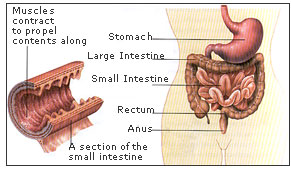|
|
Irritable bowel syndrome
 Irritable bowel syndrome, or IBS, is a problem that affects mainly the
bowel
which is also called the large intestine. The bowel is
the
part of the digestive system that makes and stores stool. The word syndrome
means a group of symptoms. IBS is a syndrome because it can cause several
symptoms. For example, IBS causes cramping, bloating, gas, diarrhea, and
constipation. Irritable bowel syndrome, or IBS, is a problem that affects mainly the
bowel
which is also called the large intestine. The bowel is
the
part of the digestive system that makes and stores stool. The word syndrome
means a group of symptoms. IBS is a syndrome because it can cause several
symptoms. For example, IBS causes cramping, bloating, gas, diarrhea, and
constipation.
IBS is not a disease. It's a functional disorder, which means that the bowel
doesn't work as it should.

Stress is an important influencing factor for IBS
patients. All who suffer from it agree that when stress increases, so do the IBS
symptoms. That, in turn, saps the energy from the patient. Practicing yoga will
initially help lessen the existing symptoms, and, if practiced regularly, will
result in less frequent and intense occurrence IBS. A bonus is that there will
be no undesired side-effects, as can be possible when medication is required.
Irritable bowel syndrome
(IBS) is a chronic, functional disorder of the gastrointestinal tract
characterized by lower abdominal pain (often severe), gas, bloating, vomiting,
diarrhea, constipation, or a combination of both, typically over months or
years.
Treatments for IBS include
changes to diet, anti-spasmodic medications, muscle relaxants, and stress
reduction.
IBS is not a disease. It's a
functional disorder, which means that the bowel doesn't work as it should.
Related Links
Articles from Healthology
Many people suffer from digestive problems
that don't go away. Sometimes the problem is irritable bowel syndrome
(IBS). This syndrome is marked by abdominal discomfort, bloating,
diarrhea, constipation or alternating diarrhea and constipation. Although
doctors don't know exactly what causes IBS, they have learned a great deal
about the wide range of symptoms experienced by people with IBS.
Diagnosing irritable bowel syndrome today is
often simpler than it has been in the past. Doctors used to focus on
ruling out other diseases and conditions. Now, doctors turn most of their
attention to a patient's symptoms. This change in approach can lead to a
speedy diagnosis and quick start of therapy.
Some people with vague digestive symptoms
needlessly suffer in silence believing there is no treatment. Abdominal
discomfort, bloating, and either diarrhea, constipation or a combination
of both, can be a sign of irritable bowel syndrome (IBS). Recent advances
in the treatment of IBS make seeing a doctor the first step toward relief.
Learn the many medical strategies used to treat this common intestinal
disorder.
Pain and bowel irregularities caused by
irritable bowel syndrome (IBS) can make a marked impact on day-to-day
living. Abdominal discomfort, bloating, diarrhea, constipation or
alternating diarrhea and constipation, can be debilitating. Learn what IBS
experts say are the many treatments that can make all the difference in
the quality of life of the 40 million people living with this very common
intestinal disorder.
For More Information:
International Foundation for Functional Gastrointestinal Disorders
P.O. Box 170864
Milwaukee, WI 53217
Phone: 1-888-964-2001 or (414) 964-1799
Fax: (414) 964-7176
Email: [email protected]
Internet: www.iffgd.org
|
|
|
|
|









